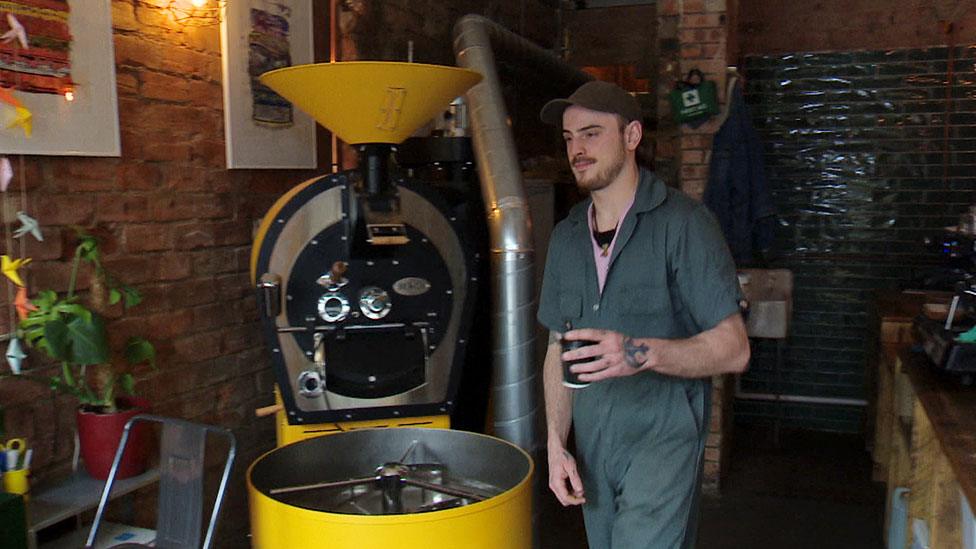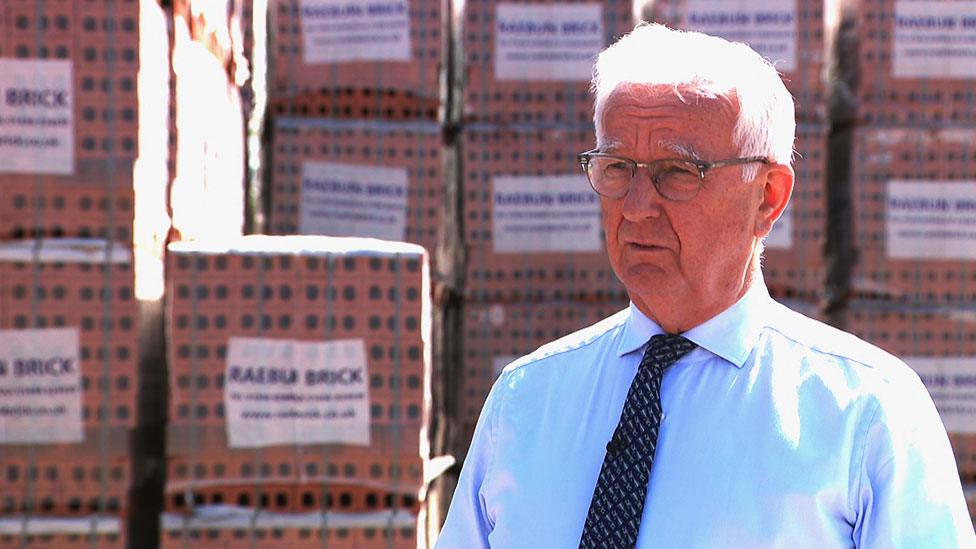Now businesses face soaring energy bills
- Published

Robbie Gray runs Canary Girl Cafe in Glasgow and is facing soaring energy bills
Businesses do not have the householders' protection of an energy price cap, though many have been helped by fixing their prices last autumn, before the surge in prices began. That lasts, for many, until autumn, and now is the time they are finding out how much more they will have to pay. Some, in Glasgow, are rebelling.
Some firms can pass on extra costs to customers, including energy suppliers themselves. But for others, they face the daunting task of absorbing costs or losing custom.
Barista and businessman Robbie Gray had enough of the soaring electricity bills for the Canary Girl Cafe.
"It's like staring into the abyss and not knowing what's coming," he says. "I'm not the kind of person who's afraid of their bills, but the last few months, I've dreaded that little brown envelope coming through the door.
"It got so bad last month that I just cancelled my direct debit, and other businesses near me were doing the same thing, in protest. I can't make sense of what the energy companies are doing. It seems they just want to kill people and crush communities. A lot of us just won't make it through."
The tiny roastery and café's supplier reminded him he had a contract, and a direct debit was part of it: "They phoned me quite a few times, demanding I put it back. But I've been staunch, and refused until they reconsidered their prices.
"To be fair, I did reinstate it, because they offered me a reduced rate. So it does work."
Gray has had difficulty getting a new roaster installed. Imported from Turkey with a wedge of import tariff following Brexit, it's gas-fired, and he couldn't get a supplier to take him on for months. Now that he has one, it was sending him estimated bills for £1,000 a month, and then £700 before he had anything switched on.
He announced on Facebook last month that he was closing, provoking a flood of returning customers, so he's staying open for now.
"It was really nice to see how many cared about us - people who didn't want us to close, people we hadn't seen for a while, people coming from as far away as Edinburgh. It was a good ego boost after the stress of the past year".
Time to negotiate
Robbie does not want to put up prices, because the community around him is not prosperous. And small batch roasted coffee beans are the very essence of a discretionary product - a luxury people can do without when budgets get tight.
They're getting tight for businesses as well as their customers. Firms such as Canary Girl Cafe are facing up to soaring energy costs, without the price cap that is supposed to ease the pain for households.
Most of them fix their prices on an annual basis, and of them, around 80% see the new contract start on October 1 each year. That was fortuitous in 2021, because prices fixed during last summer were set before the price surge began.
But for October 2022, they're going to feel a lot of pain. Energy UK, representing suppliers, says the business market differs from the residential one not only for the absence of a legal price cap but also because there is no obligation to maintain the supply.

It cannot comment on Canary Girl Cafe without knowing more of its circumstances, but it is pointed out that it can be easier for a business to negotiate a deal, sometimes using a broker. And while suppliers have been hard hit by the impact of the price cap on their residential market, there is no escaping the rising wholesale costs they will pass on to commercial clients.
A spokesman told BBC Scotland: "As has been well publicised, suppliers have been facing record wholesale costs over the past year with gas prices increasing by around 500% from the start of 2021. Suppliers have to be able to recoup these costs which unfortunately, but inevitably, means higher prices.
"We realise it's a very difficult time for business customers, as well as domestic customers, with higher prices a reality for the foreseeable future."
Elastic demand
David Hunter, an energy analyst and client adviser for Schneider Electric, says large companies have the resources to hedge their energy supplies for years ahead.
But small companies typically hedge through their suppliers, and usually for just that one year ahead. His advice is to start talking to suppliers early, finding the best deal and planning, because there will be no avoiding higher energy costs when the new contracts start.
"For some businesses, this is a real struggle," he says. "There's potentially real hardship ahead. And there is no way to sugar coat the pain of the very significant increases in commodity market that have to ultimately be passed through.
"The pain on a business depends on whether they can amend their prices to reflect these costs, and that will depend from sector to sector and business to business."
Some, such as the energy suppliers themselves, sell a product for which there is little elasticity of demand - that is, people still need to buy even when prices rise.
Coffee bean roasters, particularly in low-income neighbourhoods, are vulnerable to a downturn in demand, even if they don't raise prices, and a much sharper downturn if they do.
All in all...

Jimmy Raeburn says his business is facing a 200% increase in electricity costs
Raeburn Brick is an example of a company that retains a healthy level of demand. There used to be more than 140 brick-makers in Scotland and this one in Blantyre is the only one left on a commercial scale. More than half of its specialist product goes to England, for the olde worlde appeal of varying colour.
"Unfortunately, our contract ceases in September," says Jimmy Raeburn, co-founder and co-managing director with his brother, "And we'll be facing a 200% increase in electricity costs. As far as gas is concerned, we're paying four times what we were paying in April last year, which is," he understates, "quite a lot to absorb."
Other costs are also rising. The heavy plant to extract clay from his quarry can no longer be run on red diesel, with its lower tax rate. From this month, the UK government decided that such off-road machinery requires white diesel like road vehicles, and so the price has risen three fold.
The costs of packaging and wages are going up, while National Insurance contributions have just increased.
So Jimmy Raeburn went to his customers, mostly wholesalers in the construction industry, and asked them to accept a 30% surcharge - a temporary increase while energy prices remain high. Almost all agreed: "If we didn't have that surcharge in income, we would be losing money hand over fist. But how long will customers be prepared to pay this surcharge?"
The projections from his energy supplier are for prices coming down a bit in the new financial year, and down further the following year, "but we're never going to get back to where we were".
Related topics
- Published1 April 2022


